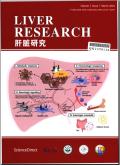Bioengineered extracellular vesicles: The path to precision medicine in liver diseases
IF 2.1
Q2 Medicine
引用次数: 0
Abstract
Extracellular vesicles (EVs) are membrane-bound entities secreted by each cell, categorized as, exosomes, microvesicles or apoptotic bodies based on their size and biogenesis. They serve as promising vectors for drug delivery due to their capacity to carry diverse molecular signatures reflective of their cell of origin. EV research has significantly advanced since their serendipitous discovery, with recent studies focusing on their roles in various diseases and their potential for targeted therapy. In liver diseases, EVs are particularly promising for precision medicine, providing diagnostic and therapeutic potential in conditions such as metabolic dysfunction-associated steatotic liver disease and metabolic dysfunction-associated steatohepatitis, hepatocellular carcinoma, alcoholic liver disease, liver fibrosis, and acute liver failure. Despite challenges in isolation and characterization, engineered EVs have shown efficacy in delivering therapeutic agents with improved targeting and reduced side effects. As research progresses, EVs hold great promise to revolutionize precision medicine in liver diseases, offering targeted, efficient, and versatile therapeutic options. In this review, we summarize various techniques for loading EVs with therapeutic cargo including both passive and active methods, and the potential of bioengineered EVs loaded with various molecules, such as miRNAs, proteins, and anti-inflammatory drugs in ameliorating clinical pathologies of liver diseases.
生物工程细胞外囊泡:肝病精准医疗之路
细胞外囊泡(EVs)是由每个细胞分泌的膜结合实体,根据其大小和生物起源可分为外泌体、微囊泡或凋亡小体。由于它们能够携带反映其来源细胞的各种分子特征,因此它们是很有希望的药物递送载体。自其偶然发现以来,EV研究取得了显著进展,最近的研究重点是它们在各种疾病中的作用及其靶向治疗的潜力。在肝脏疾病方面,电动汽车在精准医学方面尤其有前景,在代谢功能障碍相关的脂肪性肝病和代谢功能障碍相关的脂肪性肝炎、肝细胞癌、酒精性肝病、肝纤维化和急性肝衰竭等疾病中提供诊断和治疗潜力。尽管在分离和表征方面存在挑战,但经过改造的电动汽车已经显示出在递送治疗药物方面的有效性,并且具有更好的靶向性和更少的副作用。随着研究的进展,电动汽车有望彻底改变肝病的精准医疗,提供有针对性、高效和多功能的治疗选择。在这篇综述中,我们总结了各种装载治疗性货物的技术,包括被动和主动方法,以及装载各种分子(如mirna,蛋白质和抗炎药物)的生物工程ev在改善肝脏疾病临床病理方面的潜力。
本文章由计算机程序翻译,如有差异,请以英文原文为准。
求助全文
约1分钟内获得全文
求助全文

 求助内容:
求助内容: 应助结果提醒方式:
应助结果提醒方式:


